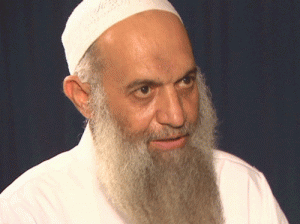 As Egypt’s military announced it had deposed the country’s first-ever democratically elected president, many Egypt watchers braced to see whether Mohamed Morsi’s Islamist followers would resort to violence as they said they would.
As Egypt’s military announced it had deposed the country’s first-ever democratically elected president, many Egypt watchers braced to see whether Mohamed Morsi’s Islamist followers would resort to violence as they said they would.
Radical Islamists such as Mohamed al-Zawahiri ( pictured right) , a leader of Egypt’s radical Jihadi movement and the brother of al Qaeda leader Ayman al-Zawahiri, promised his followers Wednesday. they would have “the upper hand” should the military follow through with its threatened coup. A day earlier, Morsi made a speech promising to defend his right to the presidency with his blood.
At least 16 people were killed overnight in clashes at Cairo University, where pro-Morsi demonstrators had gathered. Throngs of his followers in the Muslim Brotherhood surrounded his headquarters with hardhats and shields promising to protect him.
Experts say the words are matched by stockpiles of weapons that have grown since the end of civil war in Libya, next door, and through smuggling routes that run from Sudan through Upper Egypt to the Sinai Peninsula.
A military coup feeds into the narrative of Jihadi radicals such as al Qaeda, who have long argued that advancing their ideology cannot be accomplished by democratic means, but only through violence, says Shadi Hamid, director of research at the Brookings Doha Center.
“It provides real ammunition for al Qaeda and other extremist groups that have been arguing for years that change is not possible through democracy, and violence is the only way,” Hamid said.
Mohamed al-Zawahiri told the Egyptian paper Al-Masry al-Youm Tuesday that “If the United States or its agents in Egypt make an impetuous move towards confrontation, that will surely be in our favor. We have nothing to lose.”
In Morsi’s hometown of Sharqiya, the Salafi Jihadi organization issued a statement supporting the president and declaring “war against the armed forces” who would oppose him. And the group’s leader, Shalabi al-Awady, aka Abu Osama, accused the Liberal Muslim opposition of apostasy.
“They are at war with the application of Sharia, which makes them apostates who should be killed in order to prevent sedition,” al-Awady said, according to the paper.
Morsi had said in a speech Tuesday night that “If protecting the legitimacy (of the electoral results) requires my own blood, then I am willing to do this.”
Morsi’s speech “was an open incitement to violence,” said Michael Wahid Hanna, an analyst at the Century Foundation, a think tank in Washington.
State Department spokeswoman Jen Psaki said violence is a concern, and urged all sides to talk to each other.
“We’re clearly concerned about the violence on the ground and the fact this is an extremely tense situation,” Psaki said.
Citing background briefings by U.S. government officials, Hanna said weaponry has flowed out of Libya to Egypt, mostly small arms including machine guns and rocket propelled grenades. And there are links between radical Islamist militants in Egypt and similar groups in Libya, Hana said.
More and heavier weapons have been stored in the Sinai, where the presence of radicals has been growing since the overthrow of former President Hosni Mubarak in February 2011.
“This has all been compounded by a security vacuum since the fall of Mubarak,” when Egyptian security institutions that repressed extremists and dissent were weakened, Hanna said.
The Muslim Brotherhood and their security guards have weapons, and civilians do too, Hanna said. “You see it in street clashes now more than ever before,” he said.
Hamid said the Brotherhood has no trained fighting force, and would be up against “the military with the majority of the people on its side,” but he still expects violence, especially from Morsi’s more radical supporters.
Many will see this as yet another opportunity to enact religious law yanked from their hands.
The military’s action “confirms their darkest fears,” Hamid said. “Islamists see the world in this narrative of persecution and repression, of being history’s victims, being denied their rightful place in society, that anytime they come out and play their role or make gains the world conspired to destroy them.”
Their fears are founded on history. The founder of the modern Egyptian state, Gamal Abdel Nasser, crushed the Muslim Brotherhood in 1954. And when Algerian Islamists won a first round of parliamentary elections in 1991, the military stepped in and destroyed their organization, leading to a years-long civil war that came later, Hamid said.
Their tendency to paranoia and fears of conspiracy was part of their motivation over the past year. Faced with judicial edicts that dissolved their parliamentary gains, Morsi and other Islamist lawmakers sought a constitution that solidified their vision and exacerbated friction with political rivals, Hamid said.
Walid Phares, author of “The Coming Revolution: Struggle for Freedom in the Middle East,” says Muslim Brotherhood writers across the world are warning that deposing them will play into the hands of Jihadists who reject the political process. But they’re wrong, Phares says.
“This is a post-Arab Spring democratic revolution,” he says. “What’s frustrating for the Brotherhood is there’s 15 million people on the ground actually protecting the army” in Egypt.
Morsi’s defiant message, however was that he will fight, and give orders to his own followers, Jihadis and supporting units within the armed forces, to join him, Phares said.
“This would be the Samson option — If it’s not going to be me it’s not going to be anybody,” he said. “That’s what the army and (the U.S.) administration are trying to avoid.”
USA Today

Leave a Reply
You must be logged in to post a comment.